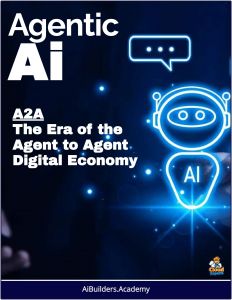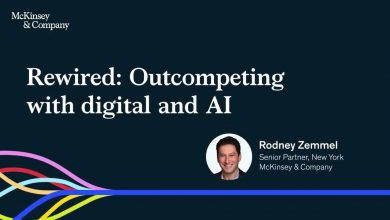Agentic AI: The Next BIG Thing in Artificial Intelligence
Agentic AI represents a significant leap forward in the field of AI, moving beyond traditional machine learning algorithms to create intelligent systems that can act autonomously and make decisions independently.
 In the realm of Artificial Intelligence (AI), a new wave of innovation is on the horizon – Agentic AI.
In the realm of Artificial Intelligence (AI), a new wave of innovation is on the horizon – Agentic AI.
This cutting-edge technology is poised to revolutionize the way we interact with machines, paving the way for unprecedented advancements in various industries.
Agentic AI represents a significant leap forward in the field of AI, moving beyond traditional machine learning algorithms to create intelligent systems that can act autonomously and make decisions independently.
Unlike conventional AI systems that rely on predefined rules and human intervention, Agentic AI is designed to exhibit agency and initiative, mimicking human-like cognitive abilities.
Key Features of Agentic AI
Artificial Intelligence (AI) agents are software programs that can perform tasks autonomously, adapting to their environment and making decisions based on data analysis and machine learning algorithms. These agents are designed to mimic human intelligence and are used in various applications such as virtual assistants, autonomous vehicles, and smart home devices.
- Autonomy: Agentic AI systems have the ability to operate independently without constant human oversight.
- Adaptability: These systems can learn from experience and adapt to new situations, improving their performance over time.
- Decision-Making: Agentic AI is capable of making complex decisions based on available data and objectives.
- Interactivity: These systems can interact with humans and other machines in a natural and intuitive manner.
Understanding AI Agents
AI agents are built using a combination of machine learning techniques, neural networks, and natural language processing. They are trained on large datasets to recognize patterns, make predictions, and learn from experience. AI agents can operate in real-time, analyze complex data, and interact with users through voice commands or text inputs.
To build effective AI agents, developers utilize a range of models and tools that enable machines to mimic human intelligence. Let’s explore the different approaches and technologies that power AI agents:
- Rule-Based Systems: Rule-based systems are one of the foundational models for building AI agents. These systems operate on a set of predefined rules and logic to make decisions. While they are relatively simple compared to other models, rule-based systems are effective for tasks with clear, deterministic outcomes.
- Machine Learning: Machine Learning (ML) is a powerful approach used in building AI agents. ML algorithms enable machines to learn from data and improve their performance over time without being explicitly programmed. Supervised learning, unsupervised learning, and reinforcement learning are common techniques used in ML-based AI agents.
- Deep Learning: Deep Learning is a subset of ML that focuses on neural networks with multiple layers. Deep Learning models, such as Convolutional Neural Networks (CNNs) and Recurrent Neural Networks (RNNs), are capable of processing complex data like images, text, and speech, making them ideal for building sophisticated AI agents.
- Natural Language Processing (NLP): Natural Language Processing (NLP) is a key technology for AI agents that interact with humans through language. NLP enables machines to understand, interpret, and generate human language, facilitating tasks like chatbots, sentiment analysis, and language translation.
The Impact of Agentic AI
The integration of Agentic AI into various industries is expected to bring about transformative changes, enhancing efficiency, productivity, and innovation. From healthcare and finance to transportation and manufacturing, the applications of Agentic AI are vast and diverse. By enabling machines to think and act like humans, this technology has the potential to revolutionize how we work, live, and interact with the world around us.
While the promise of Agentic AI is immense, it also presents unique challenges and ethical considerations. Issues related to data privacy, algorithmic bias, and the impact on the job market must be carefully addressed to ensure the responsible development and deployment of this technology.
However, with proper regulation and oversight, Agentic AI has the power to drive innovation, create new opportunities, and improve the quality of life for people around the globe.
The Future of AI
As we stand on the cusp of a new era in Artificial Intelligence, the emergence of Agentic AI signals a paradigm shift in how we perceive and interact with intelligent machines. By embracing this technology and harnessing its potential, we have the opportunity to unlock new possibilities and shape a future where AI works alongside humans to solve complex problems and drive progress.
In conclusion, Agentic AI represents a bold step forward in the evolution of Artificial Intelligence, offering a glimpse into a future where machines are not just tools but autonomous agents capable of independent thought and action. As we embark on this exciting journey, let us embrace the transformative power of Agentic AI and explore the endless possibilities it holds for the advancement of society and technology.



